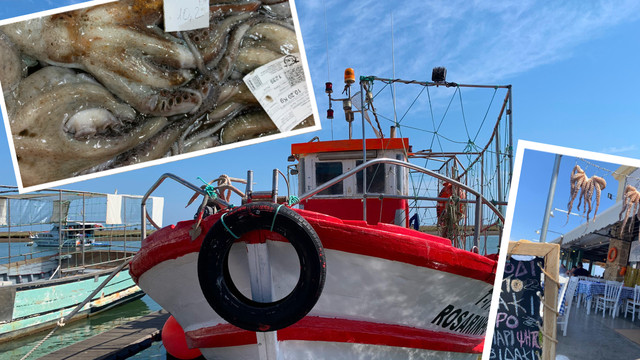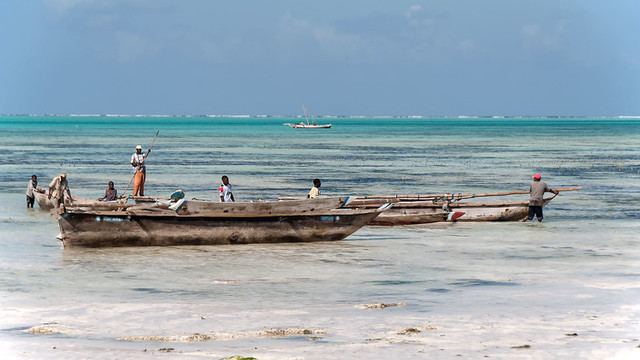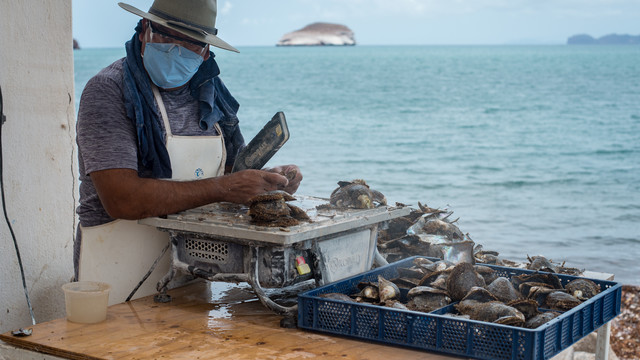Painting Africa's economy blue


Fishermen in Zanzibar, Tanzania (Copyright Yannick Beadoin)
I might be stating the obvious here, but if you think of Africa as a big island, whose water body is three times larger than its land mass, the importance of its oceans and seas cannot be overlooked.
In fact, Africa's 'blue economy' is explicitly mentioned in Agenda 2063, the African Union's 50-year vision and action plan to accelerate the continent's development. Which is why it is important to mark Africa's first official Day of African Seas and Oceans on 24 July, 2015 and the start of a Decade of African Seas and Oceans.
This official recognition celebrating Africa's maritime resources was established as part of Africa's Integrated Maritime Strategy (2050 AIM Strategy) by the Assembly of Heads of State and Government of the African Union in Addis Ababa, Ethiopia, last year.
Vice-president Danny Faure of the Seychelles called on the continent to use its Agenda 2063 to "break the mould" of African development and recognise the potential of Africa's blue economy.
Fishing for the "blue economy"
This official recognition is a major turning point for Africa's development. The 'blue economy' is an ocean-based economy including fishing, aquaculture, tourism, ocean energy and so on, that contributes to human wellbeing in an economically and environmentally sustainable way.
Africa is endowed with a variety of coastal ecosystems (PDF) — such as estuaries, coral reefs, mangrove forests, and wetlands — that provide critical services, including protecting the coast from severe weather and sea level rise, regulating water quality and quantity, providing habitat for biodiversity, and spawning grounds for aquatic species.
Fish, for example, provide multiple benefits. It's the region's most traded food commodity and this trade provides an important source of cash revenue, which in turn is used to service international debt, fund national governments' operations, or import food for domestic consumption. As such, it contributes to national food security and helps diversify diets. It is estimated that at least 58.3 million people are engaged in fisheries and aquaculture in Africa.
When fish rhymes with hunger
These benefits, however, have been ignored in national economic planning. In the case of fisheries, this is mainly because well over half of the fish produced in Sub-Saharan Africa (SSA) come from small-scale artisanal fisheries. Often these are not accounted for in national statistics and so their contribution to the economy and food security remains invisible.
Studies show that the sector is underdeveloped in SSA. As is the average food intake from fish. There is a yawning gap between the amount of food sourced from fish per person in SSA and the rest of the developing world (see graph below). What's more worrying is that the gap is growing with time.
Graph showing per capita food supply from fish and fishery products in sub-Saharan Africa and developing countries (Source: FAO FISHSTAT (2007))
Fish helps prevent hunger and malnutrition. The graph below (using IFPRI's global hunger index) shows how countries with higher per capita food supply from fish (e.g. Gabon and Ghana) have lower prevalence of hunger, while countries with very low per capita food supply from fish (e.g. Burundi, Eritrea and Ethiopia) have a far greater prevalence of hunger.

Developing the fisheries sector, among other things, can play a significant role in reducing poverty and attaining food security in the continent.
Reversing the trend
Agenda 2063 seeks to "take lessons from past experience and plan for the future". This makes it even more timely to reverse the trend and harness marine and coastal resources for a resilient and sustainable economic transformation.
The decade for Africa's oceans and seas should catalyse a shift in perspectives that recognises that our oceans and seas are economic infrastructure. This means that increased investment should be urgently made in enhancing the productive capacities of the blue economy. Africa needs to both restore degraded resources and develop those resources that are underutilised.
There is also a need for a comprehensive oceanic resources inventory and assessment, and for marine spatial planning at a regional level. By better understanding the state of Africa's marine resources and their role in our daily wellbeing, Africa will be able to make better and informed decisions for the future.
With millions of tonnes of fish worth billions of dollars estimated to be lost annually to pirate fishing in Africa, local, regional and global initiatives are needed to protect Africa's oceanic resources in line with the post-2015 development agenda.
Action is also needed to reduce post-harvest losses, which some estimates put at as much as 50 per cent. If half of the fish caught is discarded before it is eaten or sold, this is a significant socio-economic and ecological cost. Investments must be made to improve processing technologies and support fishers to access to markets.
Last, but not least, efforts must be made to increase access to financial services for fisher communities. Most poor fishers are 'financially excluded' with limited access to financial products and services.
Instead they rely on expensive informal sources of microfinance. This curbs their ability to actively participate in and benefit from employment and income opportunities, aggravating the poverty trap that they often find themselves in.




